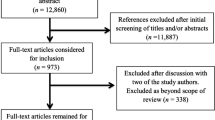Abstract
Background
The Fundamentals of Laparoscopy Surgery (FLS) program was launched over 15 years ago. Since then, there has been an exponential rise in advancements of laparoscopy and its uses. In response, we conducted an argument-based validation study of FLS. The purpose of this paper is to exemplify this approach to validation for surgical education researchers using FLS as an illustrative case.
Methods
The argument-based approach to validation involves three key actions: (1) develo** interpretation and use arguments; (2) research; and (3) building a validity argument. Drawing from the validation study of FLS each step is exemplified.
Results
Qualitative and quantitative data sources from the FLS validity examination study provided evidence that both supported claims, but also generated backing for rebuttals. Some of the key findings were synthesized in a validity argument to illustrate its structure.
Discussion
The argument-based validation approach described numerous advantages over other validation approaches: (1) it is endorsed by the foundational documents in assessment and evaluation research; (2) its specific language of claims, inferences, warrants, assumptions and rebuttals provides a systematic and unified way to communicate both the processes and outcomes of validation; and (3) the use of logic reasoning in building the validity document clearly delineates the relationship between evidence and the inferences made to support desired uses and interpretations from assessments.

Similar content being viewed by others
References
Dauster B, Steinberg AP, Vassiliou MC, Bergman S, Stanbridge DD, Feldman LS, Fried GM (2005) Validity of the MISTELS simulator for laparoscopy training in urology. J Endourol 19:541–545
Derossis AM, Fried GM, Abrahamowicz M, Sigman HH, Barkun JS, Meakins JL (1998) Development of a model for training and evaluation of laparoscopic skills. Am J Surg 175:482–487
Fried GM, Feldman LS, Vassiliou MC, Fraser SA, Stanbridge D, Ghitulescu G, Andrew CG (2004) Proving the value of simulation in laparoscopic surgery. Ann Surg 240:518–525
Pitzul KB, Grantcharov TP, Okrainec A (2012) Validation of three virtual reality Fundamentals of Laparoscopic Surgery (FLS) modules. Stud Health Technol Inform 173:349–355
Peters JH, Fried GM, Swanstrom LL, Soper NJ, Sillin LF, Schirmer B, Hoffman K, the SAGES FLS Committee, (2004) Development and validation of a comprehensive program of education and assessment of the basic fundamentals of laparoscopic surgery. Surgery 135:21–27
Vassiliou MC, Dunkin BJ, Marks JM, Fried GM (2010) FLS and FES: comprehensive models of training and assessment. Surg Clin N Am 90:535–558. https://doi.org/10.1016/j.suc.2010.02.012
Frey BB (ed) (2018) The Sage encyclopedia of educational research, measurement, and evaluation. Sage Publications, Thousand Oaks
Cronbach LJ (1971) Test validation. In Thorndike R (ed) Educational measurement, 2nd ed. American Council on Education, Washington DC
Bachman LF (2005) Building and supporting a case for test use. Lang Assess Q 2(1):1–34
Chapelle CA (2020) Argument-based validation in testing and assessment. Sage Publications, Thousand Oaks
American Educational Research Association, American Psychological Association, National Council on Measurement in Education, Joint Committee on Standards for Educational and Psychological Testing (U.S.) (2014) Standards for educational and psychological testing. AERA, Washington, DC
St-Onge C, Young M, Eva KW, Hodges B (2017) Validity: one word with a plurality of meanings. Adv Health Sci Educ 22(4):853–867
Dauster B, Steinberg AP, Vassiliou MC, Bergman S, Stanbridge DD, Feldman LS, Fried GM (2005) Validity of the MISTELS simulator for laparoscopy training in urology. J Endourol 19(5):541–545
Dulan G, Rege RV, Hogg DC, Gilberg-Fisher KK, Tesfay ST, Scott DJ (2012) Content and face validity of a comprehensive robotic skills training program for general surgery, urology, and gynecology. Am J Surg 203(4):535–539
Zheng B, Hur HC, Johnson S, Swanström LL (2010) Validity of using Fundamentals of Laparoscopic Surgery (FLS) program to assess laparoscopic competence for gynecologists. Surg Endosc 24(1):152–160
Kane MT (1992) An argument-based approach to validity. Psychol Bull 112:527–535
Kane MT (2006) Validation. In: Brennan RL (ed) Educational measurement, 4th ed, pp 17–64. American Council on Education, Praeger, Westport
Kane M (2013) The argument-based approach to validation. Sch Psychol Rev 42(4):448–457
Brunt LM (2014) Celebrating a decade of innovation in surgical education. Bull Am Coll Surg 99(11):10–15
Sroka G, Feldman LS, Vassiliou MC, Kaneva PA, Fayez R, Fried G (2010) Fundamentals of Laparoscopic Surgery simulator training to proficiency improves laparoscopic performance in the operating room – a randomized controlled trial. Am J Surg 199:115–120
Bilgic E, Kaneva P, Okrainec A, Ritter EM, Schwaitzberg SD, Vassiliou MC (2018) Trends in the Fundamentals of Laparoscopic Surgery® (FLS) certification exam over the past 9 years. Surg Endosc 32(4):2101–2105
Bachman LF (2009) Generalizability and research use arguments. In: Generalizing from educational research Jan 26, pp 137–158. Routledge
Toulmin SE (2003) The uses of argument. Cambridge University Press, Cambridge
Chapelle CA, Lee HW (2021) Conceptions of validity. In: The Routledge handbook of language testing Dec 15, pp 17–31. Routledge
Spolsky B (1981) Some ethical questions about language testing. In: Klein-Braley C, Stevenson DK (eds) Practice and problems in language testing. Peter D. Lang Frankfurt, Germany, pp 5–21
Funding
This research was funded by a grant by the Society of the American Gastrointestinal and Endoscopic Surgeons (SAGES).
Author information
Authors and Affiliations
Corresponding author
Ethics declarations
Disclosures
Allan Okrainec has received honoraria for speaking and teaching with Medtronic and Ethicon. Maryam Wagner, Carlos Gomez-Garibello, Neal Seymour and Melina Vassiliou have no relevant conflicts of interest or financial ties to disclose.
Additional information
Publisher's Note
Springer Nature remains neutral with regard to jurisdictional claims in published maps and institutional affiliations.
Rights and permissions
Springer Nature or its licensor (e.g. a society or other partner) holds exclusive rights to this article under a publishing agreement with the author(s) or other rightsholder(s); author self-archiving of the accepted manuscript version of this article is solely governed by the terms of such publishing agreement and applicable law.
About this article
Cite this article
Wagner, M., Gomez-Garibello, C., Seymour, N. et al. An argument-based validation study of the fundamentals of laparoscopic surgery (FLS) program. Surg Endosc 37, 5351–5357 (2023). https://doi.org/10.1007/s00464-023-10020-1
Received:
Accepted:
Published:
Issue Date:
DOI: https://doi.org/10.1007/s00464-023-10020-1




